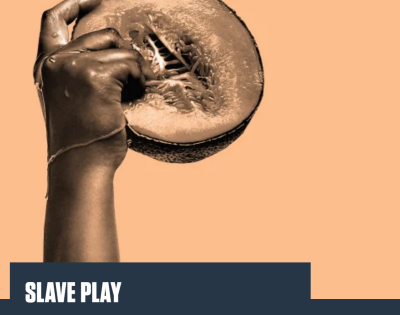MORE LIKE POWER PLAY THAN SLAVE PLAY
Boy, if you want audacious theater — even one with higgledy-piggledy results — than I’ve got one for you: Slave Play, which opened last week at the Mark Taper Forum after a Broadway run. Frankly, I can’t even say that I recommend it. The show is messy and needs serious editing, focus, and reworking, but I loved how ballsy and inventive it is. What fascinates me is that this is also a play that speaks to our equally messy times. Not only does it confront racism head-on, but it also speaks to the power given to young Black playwright Jeremy O. Harris, who had pulled his play from the Taper’s season unless the Center Theatre Group made room for more female playwrights. Um, really? That’s the kind of overblown audaciousness you’ll find in his play. (By the way, CTG responded with: “Although we have assembled a lineup featuring voices from many standpoints and identities, we acknowledge that we’ve fallen short of your expectations … [and our own] in regards to gender equity, and for that, we apologize. We can and will do better.”)
Jonathan Higginbotham and Elizabeth Stahlmann
This is not a concept play, it’s a concept of a play — and a very complicated one at that. There is basically a three-act structure to this 2-hour one act: The first has three mixed-race couples (specifically Black and White, one gay), acting out individual scenes of sexual fantasies at an old South Plantation. The second act veers to a self-help seminar in which we, the seminar attendees, watch as two female trainers take on the three couples and their issues of race in their relationship. The final act has one of the couples coming to terms post-seminar.
Jakeem Dante Powell and Devin Kawaoka
The first 30 minutes entertained, excited, amused and aroused me big time. But the seminar went on and on and on, as if the playwright spewed every thought and point-of-view on racism you could think of. Amidst the now mind-numbing conversations of inclusion and diversity, it even feels dated already. Harris is profoundly skilled at dialogue; his jargon-speak fantastic. But critical thinkers who feed on dramatic structure, be forewarned. Regardless how thought-provoking, fascinating, and clever his thoughts, both character development and cause-and-effect take second fiddle to the implausible rants. I think the media attention the play has garnered is about what the play is about versus the play itself. It’s kind of the emperors new clothes; what is Slave Play about except for provoking ideas? Specifically, that Whites do not understand, listen or empathize with the Black experience in America. Yes, it’s a challenging work to watch but it is one that has caused divisive arguments more than criticism. For all of its theatrical innovation, I left feeling theatrically unsatisfied.
Jonathan Higginbotham, Elizabeth Stahlmann, Chalia La Tour, Jakeem Dante Powell, Devin Kawaoka
In 2019 during the Broadway engagement of Slave Play, a Black Out Night was created by Harris to provide — according to the press release — a freeing environment for Black-identifying audience members to experience the unflinching new work free from the white gaze. This event occurred again at the Taper with all tickets paid for by WarnerMedia, but it was invite-only, which elucidates why I think our capitalist corporate caste system is more to blame for America’s woes than racism. Yet Black playwright Inda Craig-Galván wrote a commentary in the L.A. Times that mentioned how, when she saw it on Broadway, the white audience laughed loud, bold and inappropriately, laughing at parts that weren’t funny. Wow. People are paying hundreds of dollars a ticket, and they don’t even know how to laugh right. Oh, the privilege! How dare they not be uncomfortable when she says they should? The nerve.
Antoinette Crowe-Legacy
Ya know, I’m reminded of Arthur Miller’s furiousness with the Senate Hearing on Communism, which blacklisted his co-artists and friends from working in the industry. Instead of ranting about Communism in his next play, he wrote about brainwashing and lying in his masterwork, The Crucible. I wonder what Harris could have accomplished had he gone that route, trading his meta-theater for storytelling to perhaps a greater impact.
I propose that we have a Gay Out Night at the theater..? Wait, that would be redundant. Which is exactly what much of the writing in Slave Play is.
Paul Alexander Nolan and Antoinette Crowe-Legacy
photos by Ryan Miller/Capture Imaging
Jonathan Higginbotham, Elizabeth Stahlmann, Irene Sofia Lucio and Chalia La Tour with Jakeem Dante Powell and Devin Kawaoka (obscured)
Slave Play
presented by Center Theatre Group
Mark Taper Forum
Music Center, 135 N. Grand Ave. in Downtown L.A.
ends on March 13, 2022
for tickets ($59-$175), call 213.628.2772 or visit CTG

